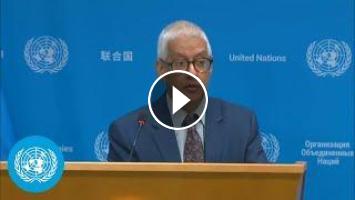Noon briefing by Farhan Haq, Deputy Spokesperson for the Secretary-General.
Highlights:
-Secretary-General
-Security Council
-Occupied Palestinian Territory
-U.N.R.W.A.
-Ukraine
-Democratic Republic of the Congo
-Burkina Faso
-Haiti
-International Days
-Financial Contributions
SECRETARY-GENERAL
Today, in Brussels, the Secretary-General attended a working lunch with the Heads of State and Government of the European Union.
Prior to the lunch, he addressed the media with Charles Michel, the President of the European Council.
The Secretary-General expressed his appreciation for the excellent cooperation between the EU and the UN, and the strong support of the EU to the UN and to multilateralism.
He told journalists that as we live in a chaotic world, with the superpowers at odds with each other, it is very important to stick to clear principles - the United Nations Charter, international law, territorial integrity of countries and international humanitarian law.
He renewed his call for peace in Ukraine, in line with the UN Charter, international law and the territorial integrity and sovereignty of Ukraine.
He also reiterated the need for a humanitarian ceasefire in Gaza.
In the morning, the Secretary-General had a meeting with the President of the European Parliament, Roberta Metsola. He also met with the President of Cyprus, Nikos Christodoulidis.
SECURITY COUNCIL
This morning, the Security Council held a meeting on Syria. Geir Pedersen, the Special Envoy for Syria, told Council members that after thirteen years of conflict in Syria, and despite a year of new diplomatic avenues, the tragic reality is that developments are all going in the wrong direction – including in the security, humanitarian, human rights, economic and political spheres.
Mr. Pedersen noted that the conflict in Gaza and its regional ramifications remain an acute source of concern, and de-escalation is essential, starting with an immediate humanitarian ceasefire there. He added that de-escalation of the conflict in Syria itself is equally urgent.
Also briefing Council members, Joyce Msuya, the Assistant-Secretary-General for Humanitarian Affairs and Deputy Emergency Relief Coordinator, pointed out that more people need humanitarian aid in Syria now than at any point in the crisis, and yet funding for our humanitarian appeal has fallen to a record low. She said that for the 4.2 million people in need in north-west Syria, the cross-border response from Türkiye continues to play an indispensable role, adding that the expansion of crossline deliveries throughout Syria, including to the north-west, remains a top priority.
OCCUPIED PALESTINIAN TERRITORY
Turning to Gaza, today, the Humanitarian Coordinator, Jamie McGoldrick, visited the Kamal Adwan hospital in Beit Lahia, in the north of Gaza. The World Health Organization has supported the establishment of a nutrition stabilization centre at this hospital to treat children with severe acute malnutrition with medical complications – these children are at risk of imminent death if they don’t receive swift treatment. Mr. McGoldrick also went to the Al Mawasi area, where he visited the UK Med Field Hospital.
During his visit, the Humanitarian Coordinator spoke with mothers whose children were suffering from malnutrition, caused by a serious food shortage in the area.
Meanwhile, the Office for the Coordination of Humanitarian Affairs reports that the Israeli military operation in and around Al Shifa hospital in Gaza city continued for a fourth straight day.
We continue to remind the parties to this conflict that international humanitarian law must be respected. Civilians and the infrastructure they rely on – including hospitals – must be protected.
Al Shifa hospital only recently restored minimal health services, and hostilities in and around the facility put those services – and patients and medical staff – in jeopardy.
People in Gaza – particularly in the north – are experiencing shocking levels of disease and hunger. We and our humanitarian partners continue to do everything we can to meet the overwhelming needs of the civilian population.
However, we are being repeatedly prevented from doing our job, especially in the besieged north. Security risks, unceasing bombardments, the collapse of civil order, and access constraints continue to impede the humanitarian response.
Full Highlights: https://www.un.org/sg/en/content/noon-briefing-highlight?date%5Bvalue%5D%5Bdate%5D=21%20March%202024
Highlights:
-Secretary-General
-Security Council
-Occupied Palestinian Territory
-U.N.R.W.A.
-Ukraine
-Democratic Republic of the Congo
-Burkina Faso
-Haiti
-International Days
-Financial Contributions
SECRETARY-GENERAL
Today, in Brussels, the Secretary-General attended a working lunch with the Heads of State and Government of the European Union.
Prior to the lunch, he addressed the media with Charles Michel, the President of the European Council.
The Secretary-General expressed his appreciation for the excellent cooperation between the EU and the UN, and the strong support of the EU to the UN and to multilateralism.
He told journalists that as we live in a chaotic world, with the superpowers at odds with each other, it is very important to stick to clear principles - the United Nations Charter, international law, territorial integrity of countries and international humanitarian law.
He renewed his call for peace in Ukraine, in line with the UN Charter, international law and the territorial integrity and sovereignty of Ukraine.
He also reiterated the need for a humanitarian ceasefire in Gaza.
In the morning, the Secretary-General had a meeting with the President of the European Parliament, Roberta Metsola. He also met with the President of Cyprus, Nikos Christodoulidis.
SECURITY COUNCIL
This morning, the Security Council held a meeting on Syria. Geir Pedersen, the Special Envoy for Syria, told Council members that after thirteen years of conflict in Syria, and despite a year of new diplomatic avenues, the tragic reality is that developments are all going in the wrong direction – including in the security, humanitarian, human rights, economic and political spheres.
Mr. Pedersen noted that the conflict in Gaza and its regional ramifications remain an acute source of concern, and de-escalation is essential, starting with an immediate humanitarian ceasefire there. He added that de-escalation of the conflict in Syria itself is equally urgent.
Also briefing Council members, Joyce Msuya, the Assistant-Secretary-General for Humanitarian Affairs and Deputy Emergency Relief Coordinator, pointed out that more people need humanitarian aid in Syria now than at any point in the crisis, and yet funding for our humanitarian appeal has fallen to a record low. She said that for the 4.2 million people in need in north-west Syria, the cross-border response from Türkiye continues to play an indispensable role, adding that the expansion of crossline deliveries throughout Syria, including to the north-west, remains a top priority.
OCCUPIED PALESTINIAN TERRITORY
Turning to Gaza, today, the Humanitarian Coordinator, Jamie McGoldrick, visited the Kamal Adwan hospital in Beit Lahia, in the north of Gaza. The World Health Organization has supported the establishment of a nutrition stabilization centre at this hospital to treat children with severe acute malnutrition with medical complications – these children are at risk of imminent death if they don’t receive swift treatment. Mr. McGoldrick also went to the Al Mawasi area, where he visited the UK Med Field Hospital.
During his visit, the Humanitarian Coordinator spoke with mothers whose children were suffering from malnutrition, caused by a serious food shortage in the area.
Meanwhile, the Office for the Coordination of Humanitarian Affairs reports that the Israeli military operation in and around Al Shifa hospital in Gaza city continued for a fourth straight day.
We continue to remind the parties to this conflict that international humanitarian law must be respected. Civilians and the infrastructure they rely on – including hospitals – must be protected.
Al Shifa hospital only recently restored minimal health services, and hostilities in and around the facility put those services – and patients and medical staff – in jeopardy.
People in Gaza – particularly in the north – are experiencing shocking levels of disease and hunger. We and our humanitarian partners continue to do everything we can to meet the overwhelming needs of the civilian population.
However, we are being repeatedly prevented from doing our job, especially in the besieged north. Security risks, unceasing bombardments, the collapse of civil order, and access constraints continue to impede the humanitarian response.
Full Highlights: https://www.un.org/sg/en/content/noon-briefing-highlight?date%5Bvalue%5D%5Bdate%5D=21%20March%202024
- Category
- United Nations
- Tags
- UN, United Nations, UNGA
Be the first to comment













